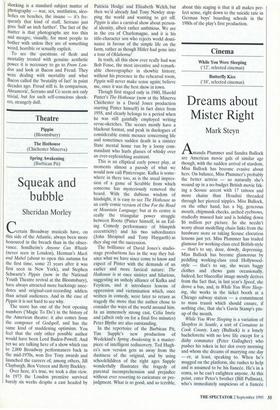Theatre
Pippin (Bloomsbury) The Hothouse (Chichester Minerva) Spring Awakening (Barbican Pit)
Squeak and bubble
Sheridan Morley
Certain Broadway musicals have, on this side of the Atlantic, always been more honoured in the breach than in the obser- vance. Sondheim's Anyone Can Whistle (never seen in London), Herman's Mack and Mabel (about to open this autumn for the first time, some 21 years after it was first seen in New York), and Stephen Schwartz's Pippin (now in the National Youth Theatre revival at the Bloomsbury), have always attracted more backstage anec- dotes and original-cast-recording addicts than actual audiences. And in the case of Pippin it is not hard to see why.
The score has one of the best opening numbers ('Magic To Do') in the history of the American theatre: it also comes from the composer of Godspell, and has the same kind of maddening optimism. You feel that the only other possible author would have been Lord Baden-Powell. And yet we are talking here of a show which ran to 2,000 Broadway performances back in the mid-1970s, won five Tony awards and launched the careers of, among others, Jill Clayburgh, Ben Vereen and Betty Buckley.
Over here, it's true, we took a dim view. In 1973 the London premiere survived barely six weeks despite a cast headed by Patricia Hodge and Elisabeth Welch, but then we'd already had Tony Newley stop- ping the world and wanting to get off. Pippin is also a carnival show about person- al identity, albeit rather ambitious. We are in the era of Charlemagne, and it is his title-character son who rejects world domi- nance in favour of the simple life on the farm, rather as though Hitler had gone into a tour of Oklahoma!
In truth, all this show ever really had was Bob Fosse, the most inventive and remark- able choreographer in showbiz history; without his presence in the rehearsal room, Pippin will never make sense again; believe me, once it was the best show in town.
Though first staged only in 1980, Harold Pinter's The Hothouse (now at the Minerva Chichester in a David Jones production starring Pinter himself) in fact dates from 1958, and clearly belongs to a period when he was still gainfully employed writing revue-sketches. The scenes mostly have a blackout format, and peak in duologues of considerable comic menace concerning life and sometimes sudden death in a sinister State mental home run by a loony com- mandant who hurls glasses of whisky over an ever-replenishing assistant.
This is an elliptical early power play, at moments almost a parody of what we would now call Pinteresque. ICafka is some- where in there too, as is the usual impres- sion of a game of Scrabble from which someone has mysteriously removed the board. With the dubious wisdom of hindsight, it is easy to see The Hothouse as an early comic version of One For the Road or Mountain Language; but at its centre is really the triangular power struggle between Roote (Pinter himself, in an Eal- ing Comedy performance of blimpish eccentricity) and his two subordinates (John Shrapnel and Tony Haygarth) as they slug out the succession.
The brilliance of David Jones's studio- stage productions lies in the way they bal- ance what we have since come to know and expect of Pinter with the demands of an earlier and more farcical nature: The Hothouse is at once sinister and hilarious, suggesting an unholy alliance of Kafka and Feydeau, and it introduces lessons of oppression and victimisation which, once written in comedy, were later to return as tragedy the more that the author chose to consider the ways of the world around him. In an immensely strong cast, Celia Imrie and (albeit only on for a final five minutes) Peter Blythe are also outstanding.
In the repertoire of the Barbican Pit, Tim Supple's new production of Wedekind's Spring Awakening is a master- piece of intelligent rediscovery. Ted Hugh- es's new version gets us away from the dustiness of the original, and by using schoolchildren of the right ages Supple wonderfully illustrates the tragedy of parental incomprehension and prejudice without ever resorting to caricature or pre- judgment. What is so good, and so terrible, about this staging is that it all makes per- fect sense, right down to the suicide rate in German boys' boarding schools in the 1980s of the play's first production.


















































 Previous page
Previous page